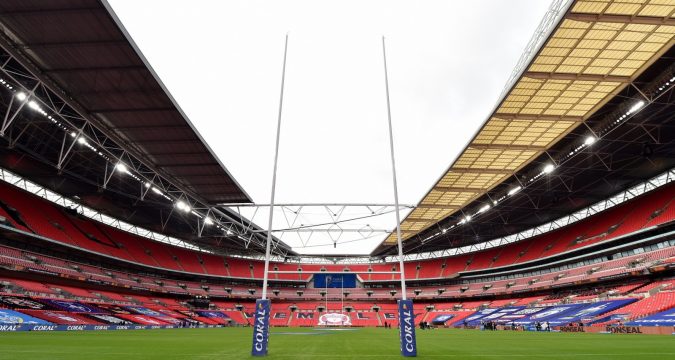
Talking Rugby League with League Express editor Martyn Sadler
This is the week when we all have to keep our fingers crossed, particularly if you are a supporter of St Helens, Castleford Tigers, Featherstone Rovers or York City Knights.
In recent weeks the upsurge in the number of Covid cases across the country as a whole has been reflected in an upsurge of cases in Rugby League, particularly in Super League, with matches being called off every week.
It means that this Saturday’s Challenge Cup Final has to be in some danger.
The RFL and the rest of us can only keep our fingers crossed that the players and coaching staff involved with all four clubs that will appear at Wembley manage to avoid the virus and any contact with anyone who has tested positive for it.
The RFL’s Covid protocols are tough ones, but they have to be applied, even when we are anticipating the Challenge Cup Final.
At the weekend it was notable that St Helens and Castleford adopted different policies in relation to their team selections.
St Helens coach Kristian Woolf named almost his strongest side for Friday night’s game against Wakefield Trinity, while Castleford coach Daryl Powell left many of his starting players out of the side that played Salford, giving debuts to several of his Academy stars.
And it was easy to see why both coaches took their respective approaches.
Playing on Friday night, Saints had eight days before the big game, which meant that if they suffered any concussion injuries, for example, those players would not be disqualified from playing at Wembley.
Castleford, on the other hand, were playing on Sunday and any of their players suffering a concussion would not have seven days to recover.
So it seems quite unfair to make the Tigers play six days before a major final, while giving their opponents eight days. Inevitably Daryl put out a side with lots of debutants in it and Salford ran up 70 points.
Having said that, on the face of it, it’s very difficult to see any result on Saturday other than a St Helens victory.
They have a stronger squad and a more settled team.
They stumbled recently, when they lost at home to Warrington, but it’s hard to see them doing that again.
Nonetheless, if Daryl Powell can put his strongest side out, then St Helens can’t take anything for granted.
We can all remember two short years ago, when St Helens went to Wembley to face Warrington Wolves as the strong favourites, but fell to an unexpected defeat, with the Wolves kicking game being clearly better on the day.
Perhaps Daryl should run a video of Castleford’s staggering 33-2 victory over Wigan in the 1994 Regal Trophy Final. That result and the margin of victory was perhaps the biggest surprise result of the pre-Super League decade.
It’s difficult, but not totally impossible, to imagine the Tigers administering the same medicine against St Helens.
Featherstone’s overwhelming favouritism
Before the start of the season, if someone had suggested that the 1895 Cup Final would have been contested between Featherstone Rovers and York City Knights, we would all have anticipated a very close game.
Unfortunately the contrast in form between these two teams this season makes such a contest appear very unlikely.
The only result that looks possible is a comfortable Rovers victory, unless York have been hiding their true form for most of the season.
On Sunday they travelled down to London Broncos, and conceded 50 points. It’s hardly a good omen.
But if their coach James Ford is going to revive his club’s fortunes, Wembley is surely a good place to start.
Chasing a French dream
For a long time I’ve wanted to see a revival of Rugby League across the Channel.
So the news last week that the French Rugby League Federation is making a very serious bid to host the 2025 World Cup is great news.
Everything will depend on whether the French government decides to support the staging of the tournament, but the initial signs look distinctly promising.
Of course the French hosted the first World Cup in 1954 and they also hosted the 1972 tournament, both of which were won by Great Britain.
In those days Rugby League World Cups only involved four nations and it was for men only, whereas this year’s tournament will involve 16 men’s teams as well as women’s and wheelchair teams. The French are saying they will replicate those tournaments and go one step further, with a World Cup youth tournament.
What a great prospect that will be!
I can hardly wait to spend time travelling around France to watch some of the World Cup games.
It’s good to see that the International Rugby League (IRL) also supports France as the preferred candidate to organise World Cup in 2025.
IRL secretary-general, Danny Kazandjian has already visited the government along with FFR XIII President Luc Lacoste and his colleagues and was “extremely encouraged” by the reception received.
“IRL has worked very closely with M Lacoste and his team to make the initial presentations to the French government,” said Kazandjian.
“We are encouraged by their response and have agreed that France are the preferred candidates for the organisation of RLWC2025.
“We continue to support the development of a compelling business plan and presentation to the government, and we believe that for many reasons, France will be able to deliver the largest World Cup ever.”
The organisers of RLWC2025 will be announced in Autumn 2021.
The above content is also available in the regular weekly edition of League Express, on newsstands every Monday in the UK and as a digital download. Click here for more details.
